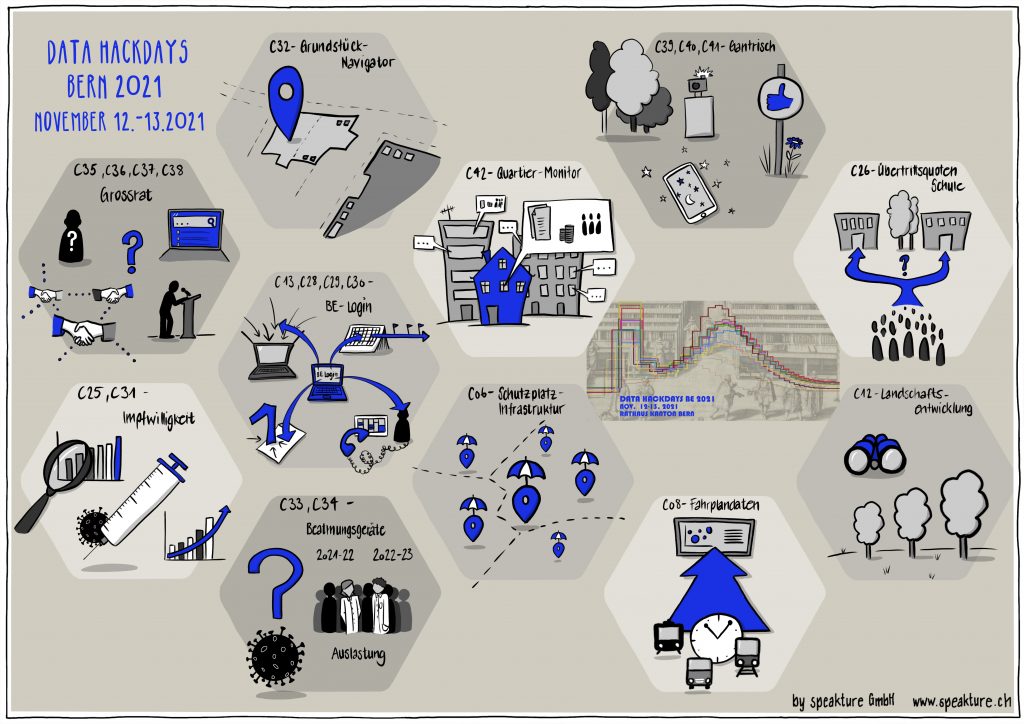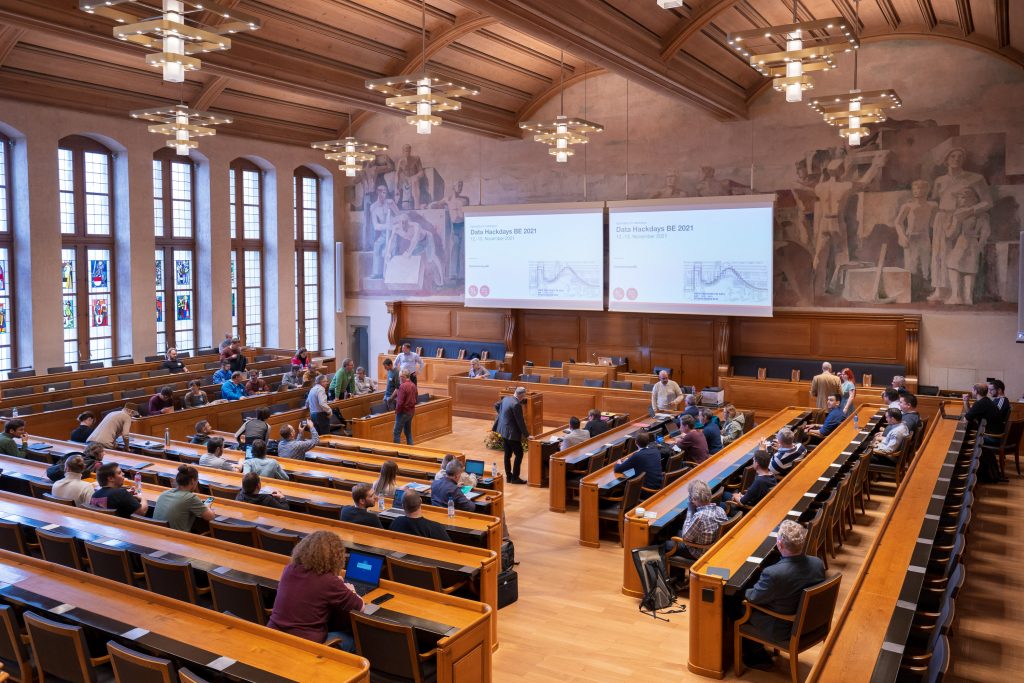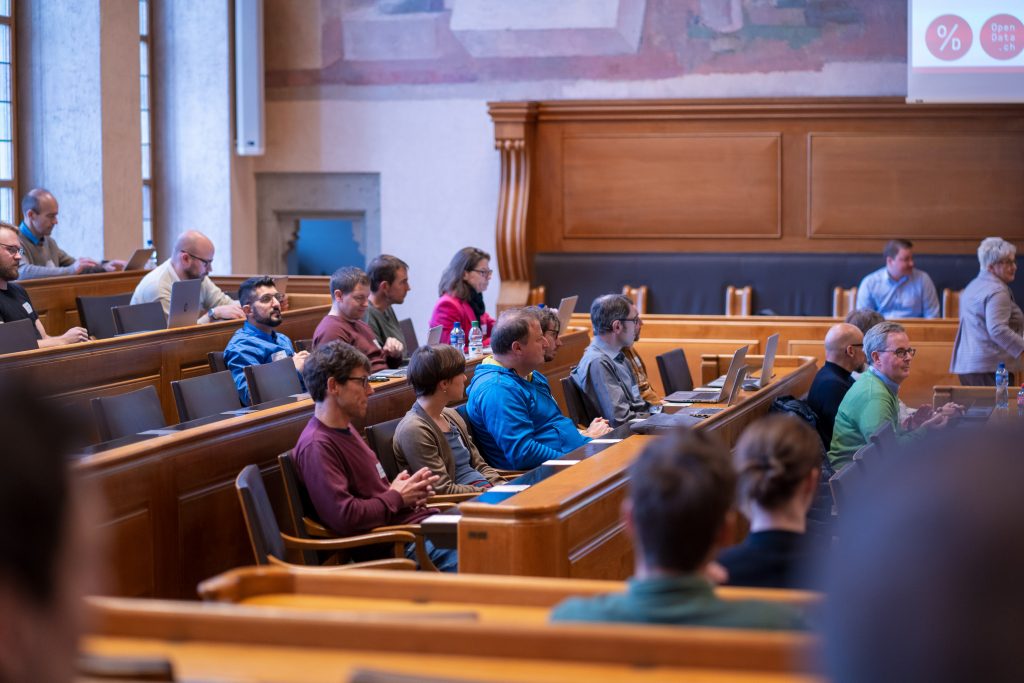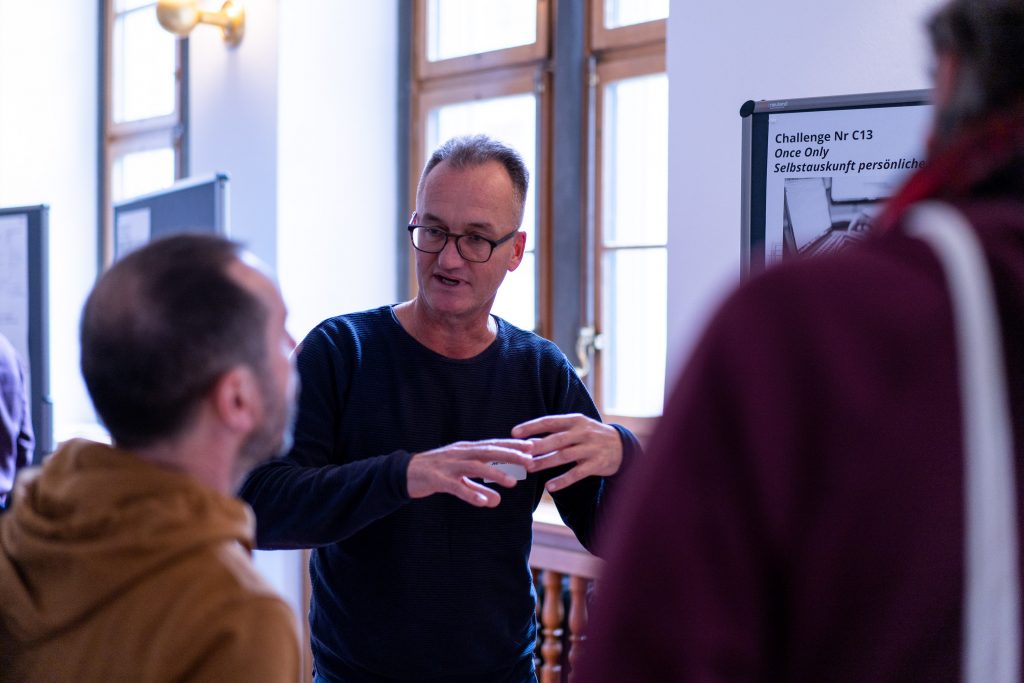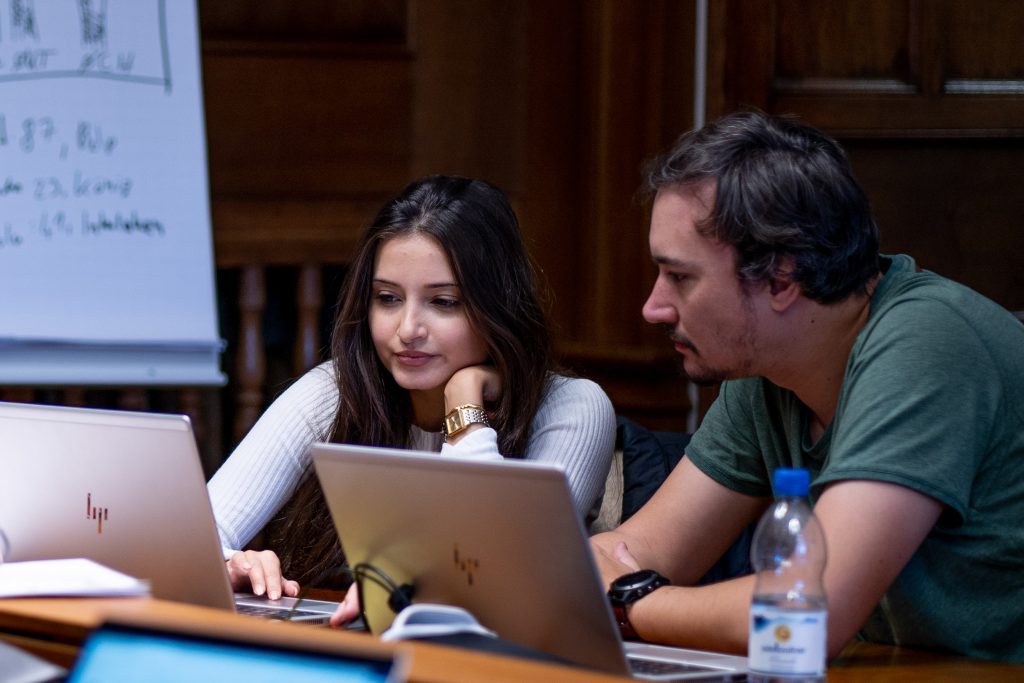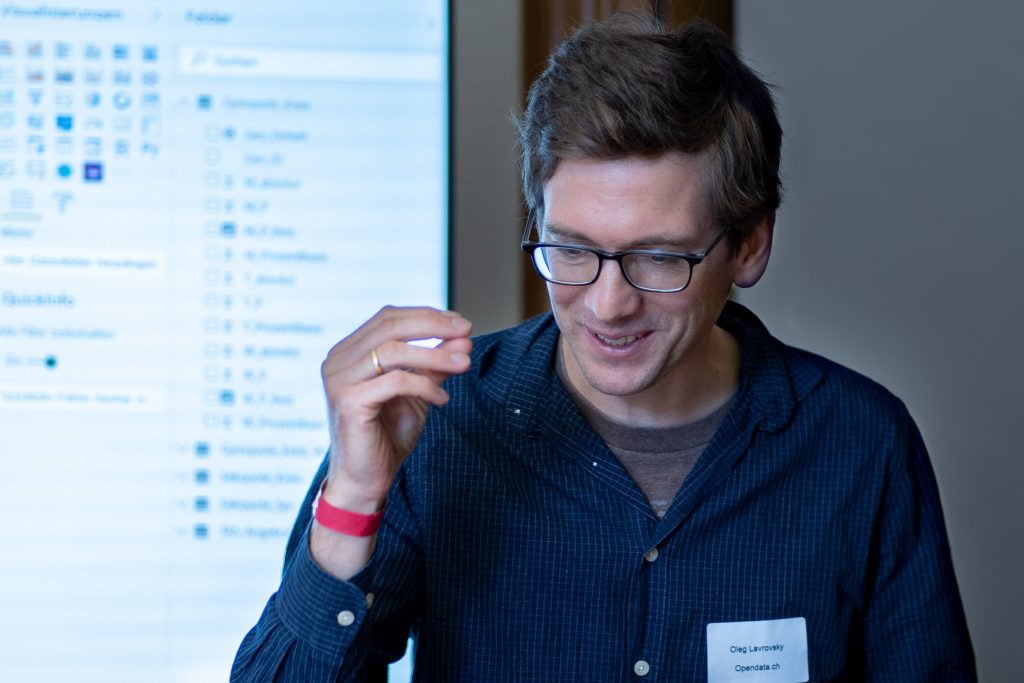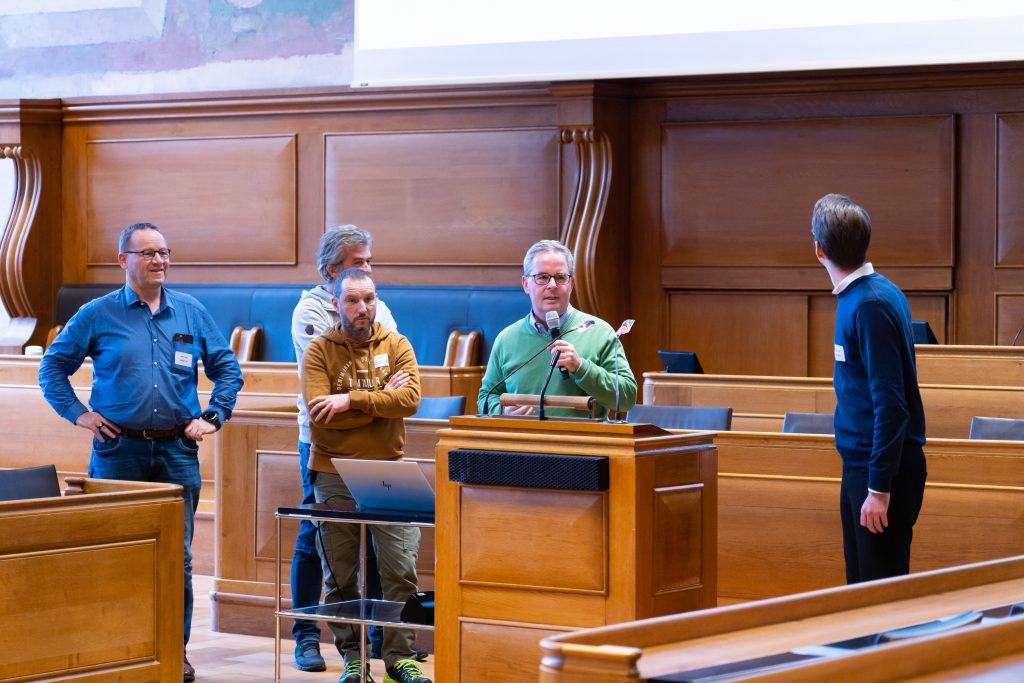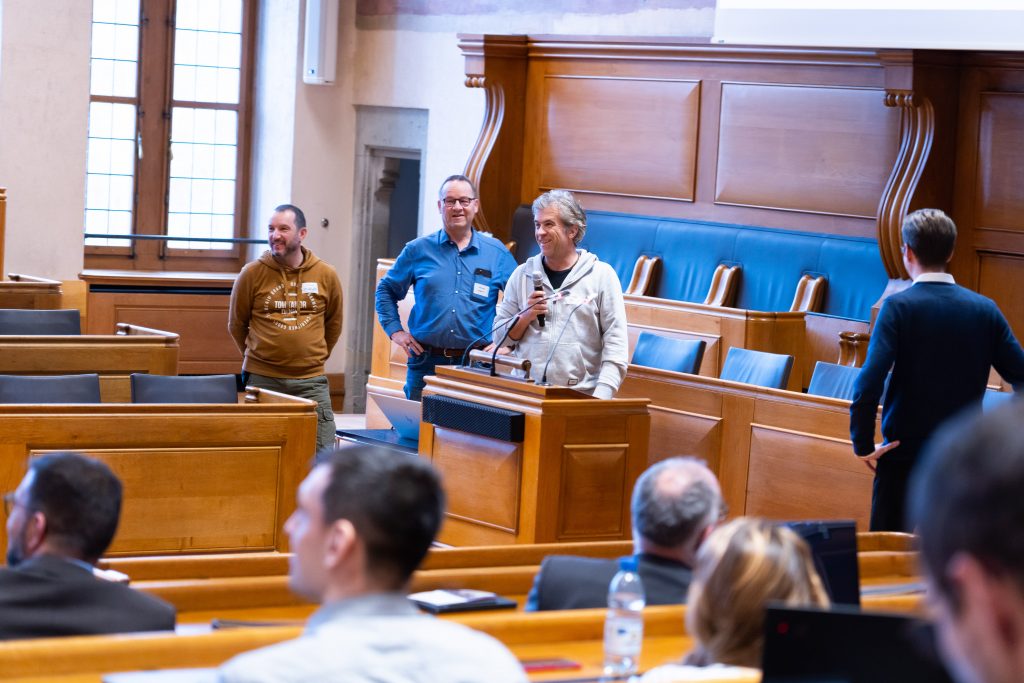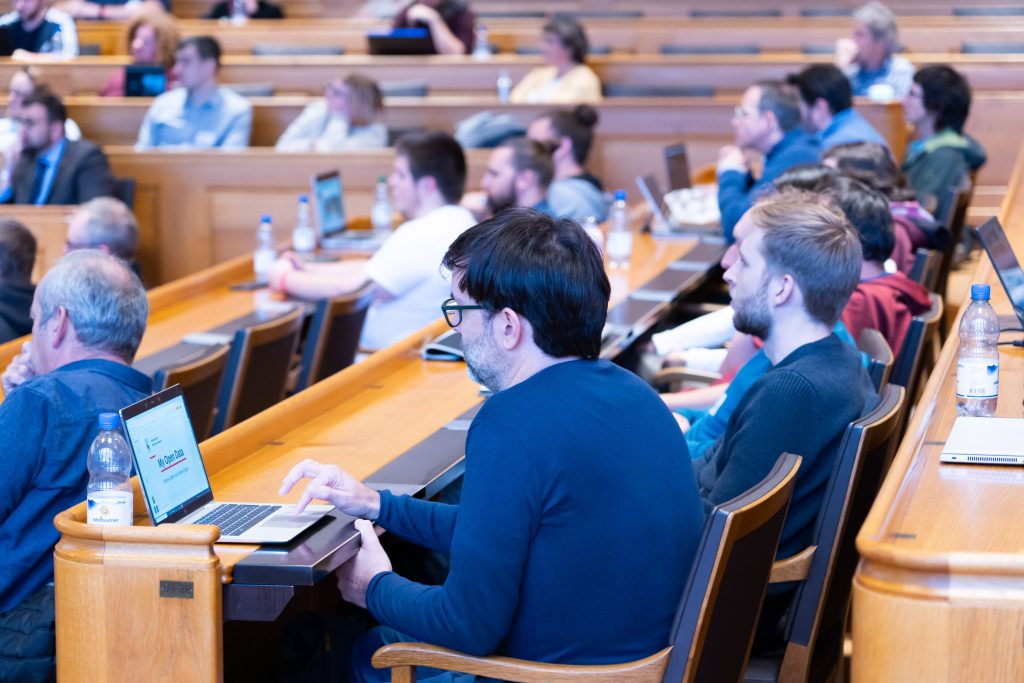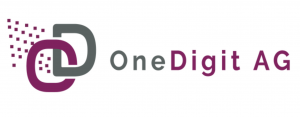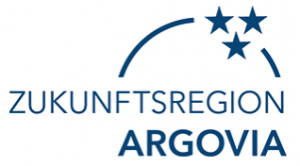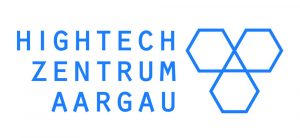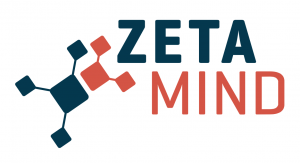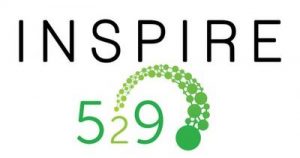Data Hackdays BE

November 12th-13th marked the premiere of the Data Hackdays BE! At these hackdays, a total of 75 participants gathered in the town hall in Bern to work on 10 exciting challenges. All of the challenges were relevant to the cantonal administration in Bern, ranging from Covid-19 vaccine analyses to public transportation and local school data analyses. The opening and closing sessions took place in the cantonal administration’s meeting chamber, whereas most of the hacking was done in different rooms all over the majestic town hall.
A big thank you to all the participants for your amazing contributions!
Below you can find a short summary of each of the challenges. Feel free to click on the link for further details as well as their documentation & source code.
Optimizing Shelter Infrastructure
How can we optimally organise shelter infrastructure, such that in case of an emergency, there is enough capacity in the necessary regions? The current shelter infrastructure is outdated. Thus, this group analysed data to find the optimal locations where new shelters should be built (e.g. based on population density and existing shelter capacity).
Public Transportation Schedule
For this challenge, the group created a plan on how to visualise public transportation data based on specific bus or tram stops.
Cantonal Personal Data Navigator
What data does the cantonal administration have on me? In order to give citizens an overview of their personal data, this group built a prototype that allows users to navigate their data based on specific categories (e.g. health, finances, mobility etc.). The vision is that users can easily (automatically) share this data with other businesses from a single source (“once-only principle”).
School Grade Transition Rates
This group created a visualisation of the rates at which children enter middle & high school in different municipalities across the canton of Bern. The data can be filtered based on gender and the language of instruction.
My Open Data
The aim of this challenge was to create a personalised and user-friendly dashboard to access various open data sets that one may be interested in. Their mockup dashboard included demographic and political data that the user could filter based on their interests.
Understanding COVID-19 Vaccination Willingness
What can be discovered about vaccine willingness based on demographic data? After signing a confidentiality agreement, this group was allowed to work with anonymised vaccine data. There were various results such as visualising vaccine rates across the canton of Bern, correlations (not causations) between political party association and vaccine rates, as well as a detailed timeline of when citizens registered and later received their vaccine.
Ventilator Capacity Analysis
By analysing various Covid-19 data, the aim of this challenge was to be able to predict hospital ventilator capacity. Based on their analysis, the group came up with a rough model of how one could predict this capacity.
Political Challenges
This group combined various interrelated political challenges, which mainly focused on increasing transparency of the Cantonal Grand Council – Who are the members? What are their ambitions? What are they effectively doing? However, the data that was necessary to answer these questions was extremely difficult to work with. Thus, the group came up with a system to sort the data so future teams can work with the data more easily.
Gantrisch Night Sky Quality
The Gantrisch Nature Park is the only region in Switzerland that is part of the Dark Sky initiative. The aim of this group was to present the data from the Sky Quality Meter app, which can be used to measure the night sky brightness, in a user-friendly way. This would help stargazers know the best locations from which to observe the night sky.
Neighborhood Monitoring
This group successfully created a prototype map on the dufour platform on which they aggregated data sets about building property areas with registry data and tax data. This gives various stakeholders the ability to get deeper demographic insights into the different neighborhoods in a given city or region.
WikiData for GLAM

As part of the Friends of Open GLAM’s Sum of all Swiss GLAMs initiative, we are organizing free introductory courses to WikiData for GLAM institutions. This initiative is supported by Wikimedia Switzerland. The courses in German will take place on location at the Berner Fachhochschule in Bern while the courses in English will take place online via MS Teams.
20. Oktober: 13:30 – 15:15
Einführung in WikiData für GLAM institutionen Teil 1
Deutsch, an der BFH (Brückenstrasse 73, 3005 Bern, Raum H031, EG Hauptgebäude)
In diesem Kurs lernen Sie die Grundlagen von WikiData für GLAM-Institutionen kennen und wie sie WikiData für Ihre Institution nutzen können. Anhand einfacher Übungen wird das Gelernte vertieft.
Inhalt des Kurses:
- Einführung in WikiData
- WikiData Syntax (RDF Triple)
- Einfaches Erfassen von Daten
- Einfache SPARQL-Abfragen
Es gelten die aktuellen Corona Regeln der BFH: GGG.
Kursleitung: Nicolai Wenger (BFH)
Anmeldung per email an: nicolai.wenger@bfh.ch.
27. Oktober: 17:30-19:15
Introduction to WikiData for GLAM institutions part 1
Englisch (online; MS-Teams)
In this course, you will learn the basics of WikiData for GLAM institutions and how you can use WikiData for your institution. Simple exercises are used to reinforce what you have learned.
- Introduction to WikiData
- WikiData syntax (RDF Triple)
- Simple data entry
- Simple SPARQL queries
The current Corona rules of the BFH apply: GGG.
Course leader Nicolai Wenger (BFH)
Registration by email to nicolai.wenger@bfh.ch.
10. November: 13:30 – 15:15
Einführung in WikiData für GLAM institutionen Teil 2
Deutsch, an der BFH (Brückenstrasse 73, 3005 Bern, Raum H031, EG Hauptgebäude)
In diesem Kurs lernen sie wie sie WikiData noch besser für Ihre Institution nutzen können. Falls Sie bereits Kenntnisse in WikiData haben können sie den Kurs auch ohne vorherigen Besuch des ersten Teiles besuchen.
Inhalt des Kurses:
- SPARQL Abfragen kreieren
- Einführung in Linked Open Data
- Batch upload
Es gelten die aktuellen Corona Regeln der BFH: GGG.
Kursleitung Nicolai Wenger (BFH)
Anmeldung per email an nicolai.wenger@bfh.ch.
17. November: 17:30-19:15
Introduction to WikiData for GLAM institutions part 2
Englisch (online; MS-Teams)
In this course, you will learn how to use WikiData even better for your institution. If you already have knowledge of WikiData, you can attend the course without having attended the first part.
Content of the course:
- Creating SPARQL queries
- Introduction to Linked Open Data
- Batch upload
Course leader Nicolai Wenger (BFH)
Registration by email to nicolai.wenger@bfh.ch.
Smart Regio Lab Lenzburg – Seetal

Keine Stadt, keine Region ist perfekt… aber du kannst sie perfekter machen! Sprudelst du vor Ideen, wie man Städte und ihre Region optimieren und reibungsloser gestalten könnte? Bist du auch der Meinung, dass grosse Veränderung mit einer Idee und einem Prototypen beginnt?
Dann ist das Smart Regio Lab Lenzburg Seetal genau das Richtige für dich! Während zwei Tagen werden wir uns mit hochaktuellen Herausforderungen wie der Wasserstoffproduktion für den Hausgebrauch, koordiniertem Hochwasserschutz oder partizipativer Raumplanung auseinandersetzen. Industriepartner und öffentliche Einrichtungen werden am Smart Regio Lab Lenzburg Seetal ihre Daten teilen, um die Entwicklung kreativer Ideen und Prototypen zu unterstützen. In Teams werden die Lösungsvorschläge dann auf lokaler Ebene erprobt und anschliessend vorgestellt.
Die Region Lenzburg-Seetal fördert viele spannende Innovationen, die einen direkten Einfluss auf unsere Umwelt und Lebensqualität haben werden.
Du kannst dazu beitragen! Sei dabei vom 15. bis 16. Oktober am Smart Regio Lab in Lenzburg!
Die Anmeldung sowie weitere Informationen findest du hier.
———————–
No city, no region is perfect… but you can make it more perfect! Are you bubbling with ideas on how to optimize and make cities and their region run smoother? Do you agree that great change starts with an idea and a prototype?
Then the Smart Regio Lab Lenzburg Seetal is just the thing for you! During two days we will grapple with highly relevant topics such as cutting-edge small-scale hydrogen production, coordinated flood prevention or participatory spatial planning. While the challenges will be tested at a local level, the resulting solutions will be scalable towards many other cities. Industry partners and public institutions will share their data at the Smart Regio Lab Lenzburg to support the development of creative ideas and rapid prototypes.
The Lenzburg-Seetal region is fostering many exciting innovations that will have a direct impact on our environment and quality of life.
You can contribute! Join us on October 15th -16th at the Smart Regio Lab in Lenzburg!
For more detailed information and registration click here.
A big thanks to our sponsors:
Opendata is shedding light on the invisible … data!

opendata.ch/2021 Forum on October 12th (online)
Shedding Light on the Invisible
We’re excited to invite you to this years’ opendata.ch/2021 Forum. The Opendata.ch/2021 Forum is a conference that offers experts and the curious the opportunity to learn and exchange the newest findings around Open Data. The forum will take place on the afternoon of October 12th, online.
With this year’s theme Shedding Light on the Invisible (Data), we will be looking at the art and science of opening data, hidden data and the space in-between: climate, health, gender and conflict!
Program
We have invited many incredibly passionate and interesting speakers who will talk about their research and processes around open data. Below you will find the preliminary program. The program is subject to change.
| Time | Speaker | Topic |
| 13:00 | SwissTopo | OGD Switzerland |
| 13:40 | Tori Boek | ODG |
| 14:20 | Andrew Young | ODG |
| 15:00 | Doug Specht | Mapping |
| 15:40 | Monika Halkort | Crisis Mapping |
| 16:20 | Marcel Salathe | Covid & Health |
| 17:00 | Aidan Peppin | Obscured Health |
| 17:40 | Simone Pengue | Forgotten Data |
Check out the speakers here
How much will the forum cost?
Participation is free. We’re grateful to be able to offer an interesting afternoon thanks to our sponsors and donors. Please sign up to take part in this year’s Forum!
Partner & Sponsors
The Opendata.ch/2020 Forum is being organized by
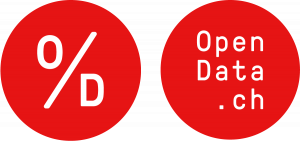
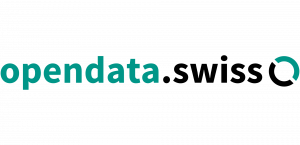
Supporters:
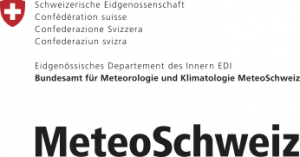

Open Farming Hackdays 2021 – ein voller Erfolg!
Vom 3.-4. September fanden am Landwirtschaftlichen Zentrum Liebegg in Gränichen die Open Farming Hackdays zum zweiten Mal, statt. Aus 18 Challenges machten 9 Teams innert 2 Tagen Prototypen die vom Sprachassistenten zum Consultingtool reichten. Hier stellen wir sie vor:
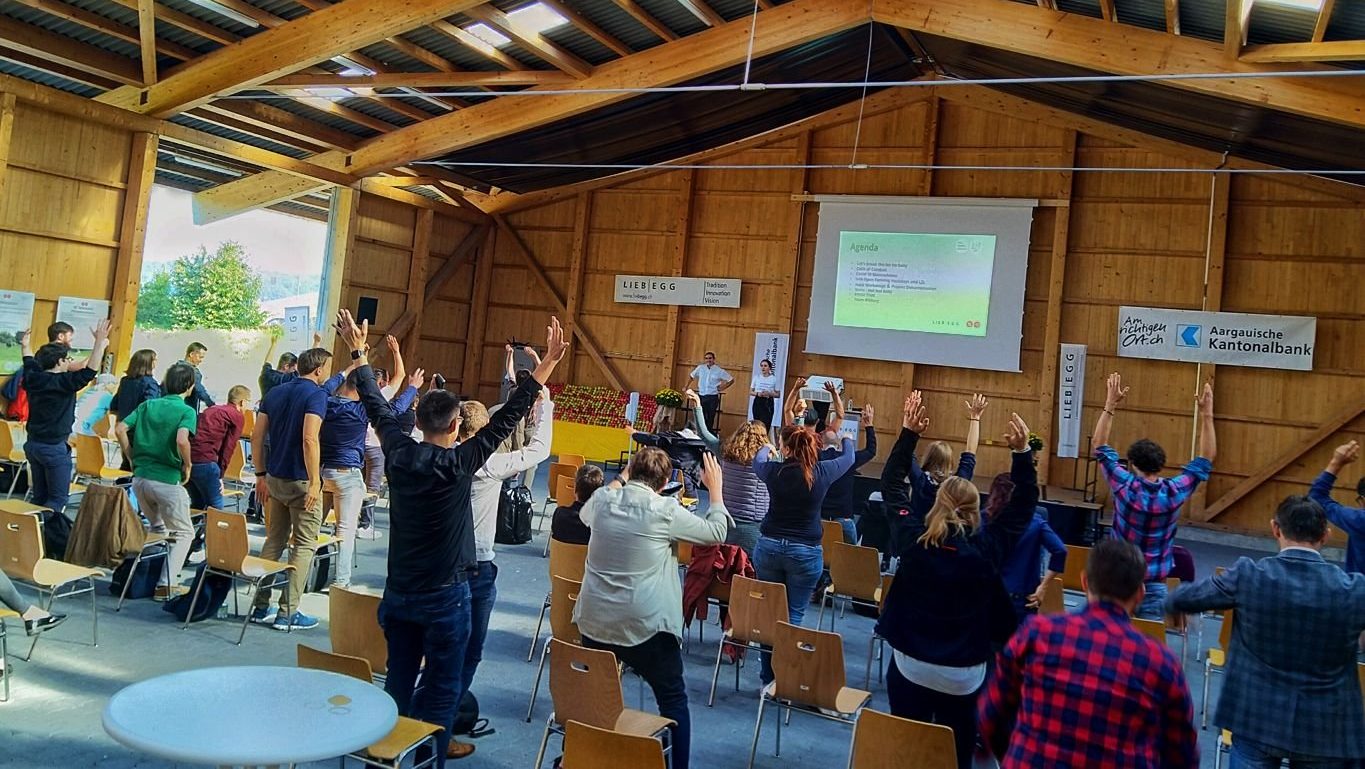
Kuhlexa
“Kuhlexa: wir stellen dich vor!” und wie sich Kuhlexa vorstellt! Das Team hat eine Sprachassistent-App entwickelt, welche Bauern und Bäuerinnen im Alltag unterstützen soll (wenn beide Hände beschäftigt sind). So könnte die Landwirtin beispielsweise beim Melken über einen Sprachassistenten Informationen bekommen, Daten erfassen oder bestimmte Aktionen auslösen. Als Vorbild gelten dabei digitale Sprachassistenten wie Amazons Alexa, Googles Assistent oder Siri von Apple.

WeedMon + WeedFight
Hier hat sich ein grosses Team in zwei geteilt um an einem ähnlichen Problem zu arbeiten: den mühsamen und ineffizienten Arbeitsaufwand vom Unkrautstechen zu automatisieren. Dabei erarbeitete das Team zwei mögliche Lösungsansätze.
1. WeedMon: Drohnenüberflug über Weiden und Äcker, um das Unkraut zu kartografieren und so auch gezielt Herbizide einsetzen zu können.
2. WeedFight: Die Planung und Entwicklung eines Roboters mit Beinen, um möglichst keine Fahrspuren zu hinterlassen.

Gastro-App für Regionalprodukte
Hier hat das Team auf einem bereits bestehenden Produkt “Buur on Tour” aufgebaut. Diese App soll Produzenten und Produzentinnen sowie Gastronomen den Kauf und Verkauf regionaler Lebensmittel vereinfachen. Geplant ist ausserdem eine zusätzliche Funktion für einen Liefer- und Abholservice. Wir hoffen das Projekt kann bald fliegen und uns in den Restaurants feine und regionale Produkte möglichst reibungslos liefern!


Dein Foodmatch – Kauf mich, Koch mich!
Und was macht man dann mit diesen regionalen, leckeren Produkten? Kochen! Dein Foodmacht ist das Tinder von Zutaten mit Rezepten: Diese Plattform zeigt aktuelle Angebote regionaler Anbieter mit passenden Rezept- und Weinvorschlägen. Konkret sollen bestehende Plattformen, die auf regionale und saisonale Produkte spezialisiert sind, miteinander verknüpft werden. Dadurch soll die Nutzerin während des Online-Einkaufs Ideen erhalten, was mit den aktuell verfügbaren Produkten gekocht werden und welcher regionale Wein dazu passen könnte.

#cropex
#cropex ist das Resultat vieler Challenge Owners. Anhand verschiedener Umweltparameter z.T. von den 2021 geöffneten SwissTopo Daten, unterschiedliche Karten, Angaben zur Bodenzusammensetzung und über bestimmte Schädlingsgebiete soll identifiziert werden, welche Pflanze wo am besten wächst. Ziel dabei ist es, die Erntemengen zu erhöhen und die Pflanzen dort anzusäen, wo sie am besten gedeihen.

Mit Konzept in die Zukunft
Welcher Bauer braucht eine Finanzberatung? Welche Bäuerin sollte sich besser mit Gastronomen vernetzen? Wie kann ein Familienbetrieb auch in Zukunft bestehen? Team “mit Konzept in die Zukunft” entwickelt einen Leitfaden (in Form von unternehmensspezifischen Fragebögen) für die strategische Planung und Beratung in landwirtschaftlichen Betrieben. Diese sollen den Betriebsleiterinnen und Betriebsleiter für die Zukunft helfen, Schwerpunkte zu setzen und die Weichen richtig zu stellen.

Die Fragebögen sind so konzipiert, dass sie nicht nur in der Landwirtschaft sondern auch in anderen Bereichen eingesetzt werden können. Die verschiedenen Branchen könnten so auch voneinander profitieren.
Digitaler Wirzkalender
Der Wirzkalender ist die erfolgreichste landwirtschaftliche Fachpublikation in der Schweiz. Heute kommt der Wirzkalender in zwei Bändern daher, welche im Taschenbuchformat gestaltet sind – dabei wäre es doch viel einfacher und nützlicher, wenn dieser via App zugänglich wäre. So könnte das ganze Wissen, welches der Wirzkalender bietet, optimal genutzt werden. Das Team hat sich dran gemacht den Wirzkalender zu digitalisieren und Begriffe zu verlinken.

FarmCHECK
Landwirte und Landwirtinnen sind dazu verpflichtet, zahlreiche Kontrollen durchzuführen, was einen enormen Vorbereitungsaufwand beansprucht. Eine Inspektions-App soll die Landwirten und Landwirtinnen bei der Vorbereitung dieser Kontrollen unterstützen. So soll die dynamische App eine digitale Checkliste beinhalten und auch konkrete und spezifische Ratschläge beinhalten.

Alle bearbeiteten Challenges sowie der Stand der aktuellen Projekte sind auf der Hack Farming Opendata.ch von Opendata.ch einzusehen. Opendata ist gemeinsam mit dem Landwirtschaftlichen Zentrum Liebegg und dem Hightech Zentrum Aargau Träger der Open Farming Hackdays, Hauptsponsorin des Anlasses war die Aargauische Kantonalbank.

Das Opendata.ch Team möchte an dieser Stelle Urs Podzorski und dem Landwirtschaftlichen Zentrum Liebegg ein grosses Dankeschön für die tolle Zusammenarbeit aussprechen.



